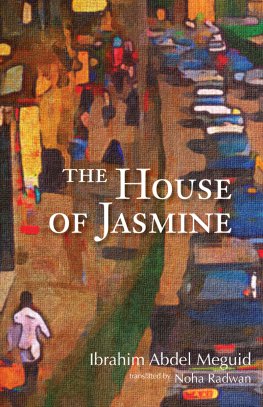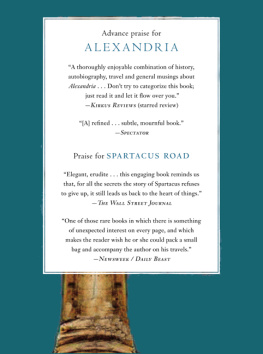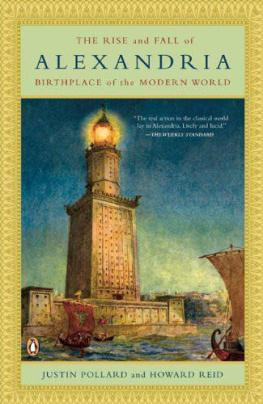Ibrahim Abdel Meguid
No One Sleeps in Alexandria
From delight to fury and from fury to light; I build myself whole from all beings.
Paul luard
The Mediterranean is an absurdly small sea; the length and greatness of its history makes us dream it larger than it is. Alexandria indeed the true no less than the imagined lay only some hundreds of sea-miles to the south.
Lawrence Durrell
The gods were disturbed by their noise, which had deprived them of sleep, so they sent a plague to them, but they soon multiplied again and their din rose, so the gods sent them a six-year drought and a seven-day great flood. The flood was so horrific that the gods also were terrified and withdrew further away into the sky.
Babylonian Flood Myth
Secret beloved voices; the voices of those who have died or who, for us, are lost like the dead. They speak in our dreams sometimes and sometimes in thought the mind hears them; with their echoes, sounds of the poems of our first life come back momentarily like a distant music in the night fading away.
Constantine Cavafy
Translators Acknowledgments
I would like to thank the following friends and colleagues for help with various aspects of the translation: Evelyn Anoya, Heather Felton, and Emily Teeter (University of Chicago); John Eisele (College of William and Mary); Gregg Reynolds (Datalogics, Inc.); Neil Hewison (The American University in Cairo Press), and Zora ONeill.
Man is clay and straw; God is the potter.
Ancient Egyptian saying
Hitler is pacing around the chancellery in Berlin, stooped slightly forward and hands clasped behind his back, in a state of deep reflection. His lips are pursed, which makes his mustache appear a little askew. His eyes are open wide with vexation, which makes them twinkle all the more. But in fact, his chest and head are about to explode. He is totally oblivious to the Chancellery guards standing at their posts and to his own bodyguards following behind him. He is wishing he could wring the Polish presidents neck.
Today is August 25, a clear day in Berlin. Hitler is thinking of old-time wars, which began as hand-to-hand combat between two commanders and ended in the defeat of one of them, whereupon he and his army surrendered to the victor. But he cannot risk that; he knows very well how small his body is even though it is he to whom Austria simply offered herself last year like a practiced whore, even though it is he who did not hesitate to invade a well-armed Czechoslovakia and met no resistance. Only the Poles are obstinate; they dont want to return to the Reich what the Treaty of Versailles has unjustly given them. He will not accept anything less than what Germany had lost. This is exactly the right time: twenty years have passed since his time in the hospital after almost losing his eyesight in the war, which had ended catastrophically for the German nation. His old bitterness haunts him a great deal; it is time he reaped the fruits of his struggle, beginning with when he joined the German Workers Party, organized the National Socialist Party and the stormtroopers, was jailed, and fought the communists, up to when he became chancellor and liquidated all his enemies, and the communists before them. The German people had supported him and cheered for him, so that he came to realize that he was the messenger sent by heaven to restore Germanys dignity. But he does not want to declare war so early. The obstinate Poles are forcing him to do it. He rushes into the chancellery.

It is now 3 p.m. sharp. Hitler signs the order to invade Poland, then heaves a sigh of relief. He orders something to eat in his office, then calls Eva Braun on the telephone and chats with her and tells her that he wont see her this afternoon. He remembers his former war minister, Blomberg, who had lured him, along with Goering the Luftwaffe chief, to be the witnesses at Blombergs marriage to a woman who, as Himmler, the chief of the secret police, later proved, was a prostitute with a police record. He curses Blomberg and all whores and remembers how he removed him from office in a thorough reorganization.
But that was last year. He does not need anyone now. He must look forward, only forward to the future. He finds himself thinking of his friend Mussolini.

It is now 6 p.m. He has not left his office yet. Attolico, the Italian ambassador, presents him with a letter from the friend he had been thinking of a few hours earlier.
In spite of Italys unconditional support of Germany, Italy cannot intervene militarily unless Germany supplies her at once with all the war materiel stated in the list attached to this letter. Hitler looks at the list, resisting a tremendous urge to explode. Ambassador Attolico does not notice Hitler shaking his head in vexation; the mans neck is not long enough for the shaking to be noticeable that would require shouting, which was what he did when he addressed the masses. But he will not give speeches now. He wants, on the contrary, to appear calm.
With sudden elation he remembers the day he entered Austria with his troops without facing a single shot. That was the morning of March 12 of last year. That day he went to Linz, where he had first gone to school as a child. There he excitedly delivered a speech to the frenzied masses. His envoy to Rome, Prince Philip of Hesse, had telephoned him the day before to convey Mussolinis warmest greetings and to intimate that Austria meant nothing at all to the Duce. Hitler responded to his envoy with overwhelming joy, saying that he would never forget the Italian leaders support, no matter what happened, and that if Mussolini ever needed him, he would stand by his side, even if the whole world were against him.
The day of his invasion, he had pondered the frenzy of the Austrians as he addressed them. He remembered how he had been born to a poor customs official and how, as a young man, he had wanted to be an artist but failed to gain entrance to the Arts Academy in Vienna, which caused him to leave Austria for Germany. Then he pondered his triumphant entry into his childhood home. Remembering the telephone conversation of the day before, he became ecstatic with joy. What more could anyone want, than to feel that providence was on his side? He had made his decision to annex Austria to the Reich. Today, however, Mussolini was letting him down before he even started the war.
Hitler becomes a bit depressed. He almost calls Eva Braun to summon her to his office. The arrogant Poles are standing like boulders in my way, he thinks. My dear friend who brags about my believing in his ideas is letting me down. What kind of people are these Italians? Real pirates! But these pirates can go into battle in the Mediterranean against the French and keep them busy until Poland is no more. Mussolinis letter was not a good sign.
Therefore, when the telephone rings, he hesitates before picking it up. He lifts it to his ear and listens as his foreign minister, Ribbentrop, tells him that a mutual defense treaty between England and Poland had just been signed.
At this moment, the Fhrer cannot think of anyone but Keitel, the chief of staff. He summons him at once and calmly tells him, as if dismissing the whole matter, Stop everything at once. I need time for negotiations.

It is not a long time, just five days. There is a blackout in Paris; leaflets urging women to volunteer in the army are distributed in French cities. France declares full confidence in her generals: Gamelin, Darlan, and Vuillemin, the chiefs of staff of the army, navy, and the air force. General mobilization is declared; troops and convoys pass through the streets of Paris on their way back to their barracks. In London, the platforms of Waterloo station fill with suitcases and luggage as women and children leave for the countryside. In Italy, Mussolini issues an order dividing the army in two: one branch commanded by Crown Prince Umberto, and one commanded by Marshall Graziani; the government confiscates coffee beans from the markets, declaring that the government will handle the coffee trade in order to supply the armies. All this despite the fact, as Hitler understood from the letter, that Mussolini was reluctant to side with him in the war.













